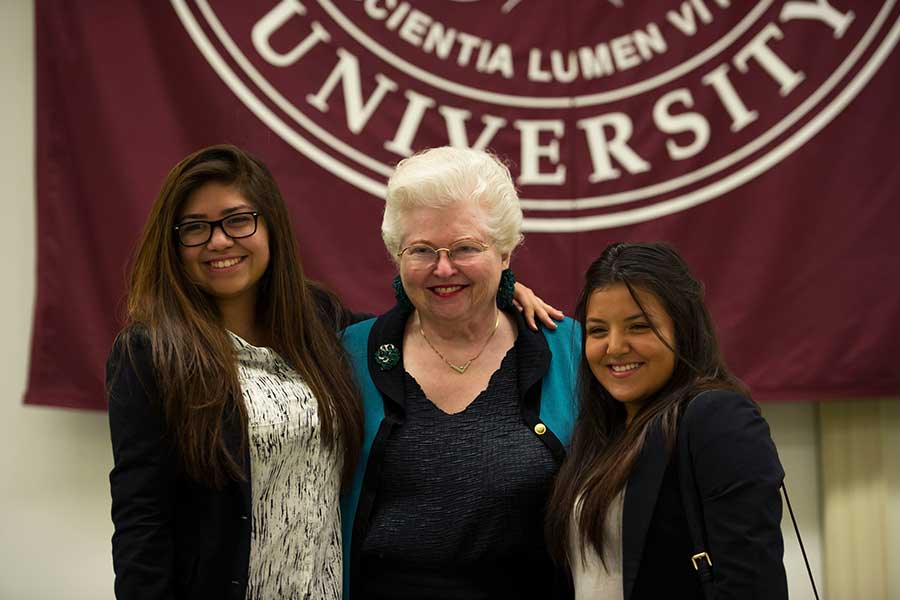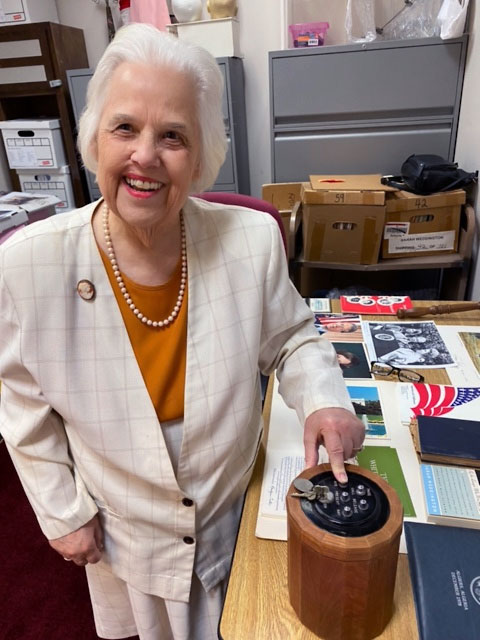Weddington’s legacy as women’s rights trailblazer lives on

In 1971, 26-year-old Texas lawyer Sarah Weddington stood in front of the U.S. Supreme Court arguing Roe v. Wade, a landmark case still making headlines today. Weddington’s legacy, however, is defined by much more than this one court case. She devoted her life to improving opportunities for women in Texas, across the United States and internationally.
Born in 1945 in West Texas to a minister and a teacher, Weddington aspired to become an attorney after graduating with her bachelor’s degree in English from McMurray College.
“Sarah’s family was of modest means,” lifelong friend and Texas Woman’s University Professor Phyllis Bridges, PhD, recalled recently. “She didn’t want to burden her family, so she moved to Austin and took two jobs to pay for law school.”
One of the positions was as a medical librarian in a hospital. “Sarah was great in this position as she always took meticulous notes and was very thorough. This practice served her well and is evident in her excellent records documenting her speeches and court cases.”
These notes make up a portion of the documents and other artifacts donated by Weddington's estate to the Jane Nelson Institute of Women’s Leadership at TWU, as part of the Sarah Weddington Collection now housed in the Denton-based Blagg-Huey Library’s Special Collections.

When Weddington attended law school at the University of Texas, there were only 40 women and 1,600 men. One of her classmates was former Texas legislator, U.S. Senator and Ambassador Kay Bailey Hutchison.
“They formed a bond that remained through Sarah’s life. One a Republican. One a Democrat. Both united in doing great things for the Republic of Texas,” Bridges said.
After her law school graduation in 1967, Weddington focused on making headway on opportunities for women. It didn’t take long for her to be known as a trailblazer. In 1972, she prevailed in a state election, becoming the first woman from Travis County in the Texas Legislature, joining four other women elected to the legislature that year—the most ever represented at the time. She served three terms.
Prior to 1973, women in Texas couldn’t possess credit cards in their own names. Weddington and her female peers initiated legislation to give women access to credit. They pushed through bills related to preventing pregnant teachers from being fired and rape reform.
In 1977, U.S. President Jimmy Carter nominated her for the position of general counsel of the U.S. Department of Agriculture, the first woman to be selected for that role. As general counsel for this department, Weddington oversaw international trade agreements related to agricultural products and the WIC nutrition program for mothers and their children. Just a year later, Carter asked Weddington to join him in the White House as his special assistant on women’s issues.
“She attended cabinet-level meetings, contributed to strategy, provided ideas and established an office focused on women’s issues in the White House,” Bridges said. “Her notes from that time are in the collection now housed at TWU.”
Weddington represented the White House internationally as well, co-chairing the Mid-Decade Conference on Women in Copenhagen in 1980, sponsored by the United Nations. And, she helped plan visits to the White House by foreign dignitaries such as Queen Elizabeth and former UK Prime Minister Margaret Thatcher.
After leaving the White House, Weddington continued her public speaking duties and began teaching in universities, including a time at TWU as a distinguished professor. She was the first speaker in Texas Woman’s Jamison Lecture series.
“Sarah had long ties to TWU,” Bridges recalled. “Her youngest sister graduated from TWU with a master’s degree in education. On the day of her sister’s graduation, Sarah was on the stage as the keynote speaker. She also mentored our students, inspiring at least one of them to pursue a law career.”
Near the end of her life, Weddington remembered her connection to TWU and the university’s history of women’s leadership.
“When it came time to decide where she wanted to place her papers, Sarah had many offers,” Bridges said. “She chose to donate her papers to TWU. It’s one of the largest collections of this type anywhere. She worked at the state, federal and international levels. She was meticulous in her record collection. This collection is valuable historically. Valuable culturally. Valuable financially. We are fortunate to be able to share her legacy with future generations.”
Media Contact
Deanna W. Titzler
Director of Public Relations
940-898-3252
dtitzler@twu.edu
Page last updated 11:58 AM, March 8, 2022